Professional Courses
Industry-relevant training in Business, Technology, and Design
Categories
Interactive Games
Fun games to boost memory, math, typing, and English skills
Typing
Memory
Math
English Adventures
Knowledge
Negative Marking in JEE Main: How to Avoid It

If you're preparing for JEE Main, one of the first questions you’ll ask is: Is there negative marking in JEE Main? The answer is yes, and it can drastically affect your score.
This blog dives deep into how the negative marking system works in JEE Main 2025, why it matters, and most importantly, how to avoid it. We’ll share practical tips, psychology-backed approaches, and success strategies from past toppers to help you navigate the exam smartly and confidently.
Let’s start by understanding exactly how the marking system works.
How Does Negative Marking Work in JEE Main?
JEE Main has a specific marking scheme that includes negative marking for incorrect answers:
- Correct answer: +4 marks
- Incorrect answer: -1 mark
- Unanswered: 0 marks
This applies to Multiple Choice Questions (MCQs) across Physics, Chemistry, and Mathematics. Numerical-type questions do not have negative marking.
Understanding this helps you build a smarter approach to attempting questions.
Why Negative Marking Matters More Than You Think
A single incorrect guess can cost you 5 marks (1 mark lost and 4 not gained). If you make four such mistakes, that’s 20 marks, a big drop in percentile.
Here’s what negative marking can do:
- Push your rank down by thousands
- Undo the benefit of questions you solved correctly
- Cause unnecessary stress and anxiety
- Lead to panic and rushed guesses in the final stretch
This is why a major part of smart preparation is learning how to minimise silly mistakes and avoid risky guessing.
5 Common Causes of Negative Marking in JEE Main
1. Random Guessing Under Pressure
You’re short on time and unsure, so you guess blindly and often lose marks.
2. Calculation Mistakes
Silly math errors, unit mismatches, or skipping steps lead to wrong answers.
3. Misreading the Question
Rushing through questions often means missing key words like “not”, “incorrect”, or “maximum”.
4. Poor Time Management
Running out of time pushes you to panic-solve, and that’s when accuracy drops.
5. Not Marking the OMR/Online Answer Carefully
A simple click on the wrong option can cost you, especially when you don’t cross-check.
10 Proven Strategies to Avoid Negative Marking
1. Attempt Only What You’re Sure Of
Stick to questions where you’re 100 per cent confident. Accuracy matters more than attempts.
2. Use Elimination Smartly
When unsure, eliminate obviously wrong choices. If two options remain, weigh risk vs reward.
3. Skip Fast, Come Back Later
Can’t solve in 60 seconds? Skip it and return later. Avoid forcing it.
4. Use Rough Sheets for All Calculations
Don’t solve mentally, write it down. This reduces silly calculation mistakes.
5. Read the Question Twice
Underline key terms. Confirm what’s being asked for value, unit, condition, or exception.
6. Practice With Timer and Pen
Simulate real exam conditions in every mock. Train your brain for high-pressure accuracy.
7. Don’t Let Confidence Turn to Carelessness
Many mistakes happen in “easy” questions when students go too fast. Slow down just a little.
8. Review Your Marked Answers
In the last 10 minutes, double-check questions you were unsure about.
9. Build a Mistake Tracker
Note down every mistake you make in practice. Learn from patterns and avoid repetition.
10. Take Full-Length Mocks Weekly
Mocks help you find where you're losing marks. The more you take, the better your judgment becomes.
Subject-Wise Tips to Reduce Negative Marking
Physics
- Units matter, double-check them
- Watch out for sign conventions and directions
- Use diagrams to confirm logic
- Practice numerical solving daily
Chemistry
- Don’t mix up similar-sounding terms (oxidation vs. reduction)
- Revise NCERT line by line for Inorganic
- Focus on exception-based questions
- Know standard values and conversions
Mathematics
- Don't rush calculations, double-check tricky steps
- Simplify expressions cleanly
- Watch for squaring and sign errors
- Use formula sheets to reinforce memory
What Do Toppers Say About Negative Marking?
Many high scorers in JEE Main consistently emphasise:
- “It’s not how many you attempt. It’s how many you get right.”
- “Don’t fear leaving questions. That saved my score.”
- “I always skipped 5–7 questions but got 98+ percentile.”
Toppers build discipline and self-awareness. They don’t guess wildly. They prepare with accuracy in mind from day one.
Real Example: The Impact of 5 Mistakes
Suppose you correctly solve 60 questions (+240), but guess 5 and get them all wrong (-5). Your score becomes 235.
Now, if you had left them blank, your score would have been 240, possibly 2 percentiles higher.
This is how small mistakes affect big outcomes.
Psychological Tricks to Avoid Panicked Guessing
- Take 2 deep breaths before each section
- Say “skip it” aloud in your head for confusing questions
- Pretend every question costs ₹100. Would you risk it?
- Train yourself to enjoy leaving questions unanswered
- Look at questions as opportunities, not pressure points
The brain under stress makes poor decisions. Calmness is a skill built with practice.
Final Month Strategy to Avoid Mistakes
- Take 3 mocks per week
- Analyse every mistake within 24 hours
- Practice error-heavy topics daily
- Revise formulas and key exceptions
- Reduce distractions and increase mindfulness
Final Thoughts
Negative marking isn’t just a rule; it’s a mindset trap. But with practice, awareness, and discipline, you can beat it.
Start treating accuracy as your superpower. Build exam stamina with mocks. Focus on clean problem-solving and leave guesses behind.
Explore structured tools and topic-specific mocks:
Class 11 Resources
Class 12 Resources
Bonus Section: How to Train for Accuracy Without Fear
Overcoming fear of negative marking requires retraining your brain.
- Create low-pressure practice: Take mini mocks where you score only for accuracy, not speed.
- Set an "error limit": Tell yourself you can afford only 3 mistakes in a mock, then play within that rule.
- Build your guessing rules: For example, only guess when you’ve eliminated two options. Write this rule and follow it.
- Make accuracy a personal metric: Track not just how many you solved, but how many you solved correctly. Aim for 90%+ accuracy.
Case Study: How Riya Went from 40 to 90 Percentile
Riya, a student from Jaipur, attempted 70 questions in her first JEE Main mock and scored only 120 marks. She was devastated. Her accuracy was around 55 per cent.
Here’s what changed in the next 3 months:
- She reduced attempts to 58–60
- Built a daily habit of solving questions slowly but correctly
- Tracked her mock errors in a digital spreadsheet
- Spent 45 minutes every Sunday reviewing previous mocks
- Stopped comparing her attempt count with friends
By January, Riya was scoring 180+ with just 62 attempts — and a 91 percentile. She avoided negative marking not by solving more, but by solving smarter.
Bonus: How to Train Yourself to Skip Questions
Most students fear skipping because they associate it with failure. But skipping is a skill.
Here’s how to train it:
- In 3 practice mocks, limit yourself to 60 questions
- Label hard questions “Maybe”, revisit them after completing the easy ones
- Celebrate every intentional skip (yes, really)
- Reflect: Did skipping help your confidence, focus, or result?
Skipping a question is not surrender, it’s strategic survival.
Exam Day Gameplan: Smart Attempts Strategy
- Attempt Round 1 (60 minutes): Solve only confident questions
- Round 2 (45 minutes): Revisit the “Maybe” marked questions
- Final Round (15 minutes): Review all questions where you may have mis-clicked or misread
This method keeps your brain fresh and your accuracy sharp.
Final Checklist to Avoid Negative Marking
✅ Practice mock tests in exam-like conditions
✅ Track errors and avoid repeating them
✅ Stop blind guessing
✅ Read every word of the question
✅ Attempt fewer, but attempt correctly
✅ Skip with confidence, not guilt
✅ Stay calm, focused, and intentional
Avoiding negative marking is not about fear. It’s about precision.
Let negative marking work in your favour, not against you.
Explore structured JEE prep tools here:
Allrounder.ai Class 11
Allrounder.ai Class 12
Final Motivation: It's Not About Fear, It's About Control
Every serious JEE aspirant has made mistakes. What separates the top scorers is that they learn from them early.
Negative marking is a challenge, yes, but it’s also an opportunity to build mastery over your thought process and exam temperament. It teaches you restraint, control, and precision, all of which are valuable beyond the exam hall.
The earlier you train your brain to value accuracy over ego, the better your performance will be.
So trust your preparation, avoid panic-solving, and keep sharpening your approach with every mock. You don’t need to attempt all questions. You just need to attempt the right ones.
And that’s how you win one smart move at a time.

Learn how negative marking works in JEE Main 2025 and how to avoid it with practical, proven strategies.

Learn how to prepare for JEE Main 2025 with a proven, winning strategy. Get a detailed plan, subject-wise tips, and...

Learn the chapter-wise weightage for JEE Main 2025 across Physics, Chemistry, and Maths. Prioritise smartly and...

Discover the most important chapters for JEE Main 2025 across Physics, Chemistry, and Maths. Focus your prep smartly...

Discover top JEE Main books for Physics, Chemistry & Maths. Learn how NCERT & reference books pair with AllRounder.
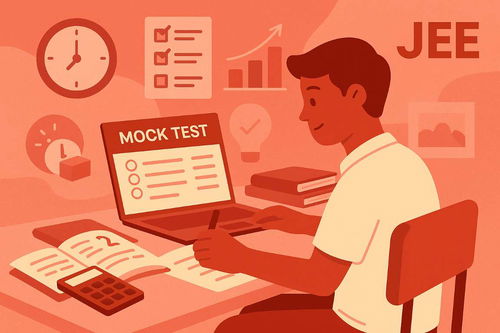
Looking for free JEE Main mock tests to boost your preparation? Discover the best platforms, tips, and strategies to...

Discover what scores and percentiles are needed to secure seats in top NITs, IIITs, and GFTIs. Learn how category...
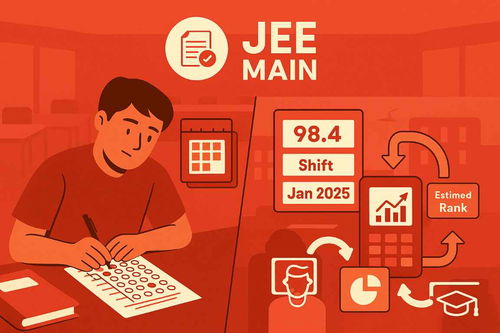
Understand the exact difference between JEE Main percentile and rank. Learn how scores are normalized across...

Understand the JEE Main scoring system to maximize your result. Learn the marking scheme, how to handle negative...

Confused about the JEE Main attempt limit? This guide clarifies how many times you can appear, the eligibility...

Wondering how many times you can appear for JEE Mains? This guide explains the total attempts allowed, session...
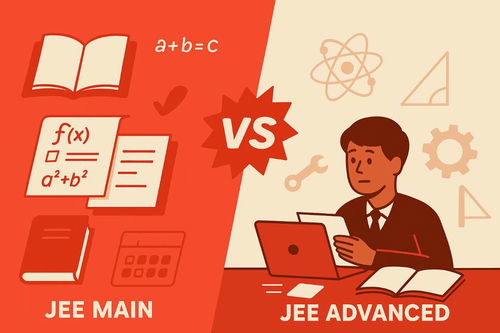
Discover the key differences between JEE Main and JEE Advanced in terms of syllabus, pattern, difficulty, and prep...

Confused about JEE Main qualification rules? This blog gives you a detailed checklist of eligibility criteria,...

Explore this simple, step‑by‑step guide to the JEE Main counselling process. Learn how to register, fill choices,...

Curious about how many times SC students can attempt JEE Main? This complete guide covers JEE Mains attempt rules,...

Want to score 200+ in JEE Main? This practical guide gives you proven tips, subject-wise strategies, mock test...

Wondering how the JEE Main exam is structured? This complete guide breaks down the official JEE Main exam pattern...
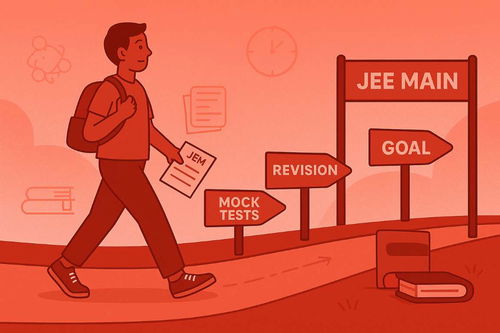
Learn how to crack JEE Main on your first attempt with proven strategies. This guide covers planning, conceptual...
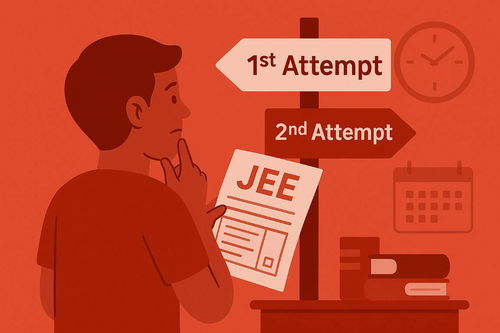
Learn how many JEE Main attempts you can take after Class 12. This guide covers eligibility, attempt limits, subject...
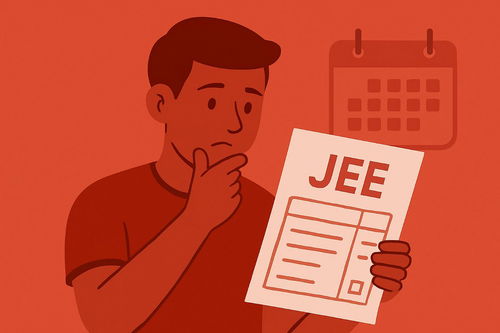
Learn about the JEE Main age limit requirement and key eligibility rules. Understand the attempt policy, Class 12...

Discover the most important topics for the JEE Main exam in Physics, Chemistry, and Mathematics. Learn subject-wise...

Get a subject-wise preparation strategy for JEE Main step-by-step using smart tips and trusted resources from AllRounder.ai.

Looking to score high in JEE Main 2026? Discover expert preparation tips on creating smart study plans, mastering...

Confused about JEE Mains eligibility? This detailed guide explains JEE Mains eligibility criteria including...
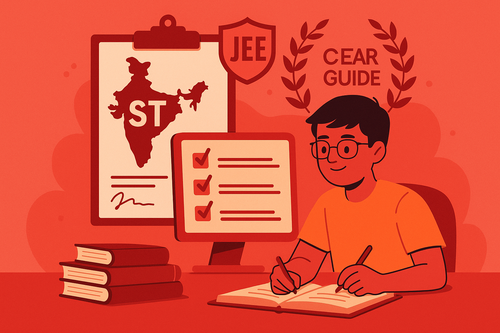
Confused about JEE Main Attempts for ST Category? This detailed guide covers attempt limits, age relaxations,...
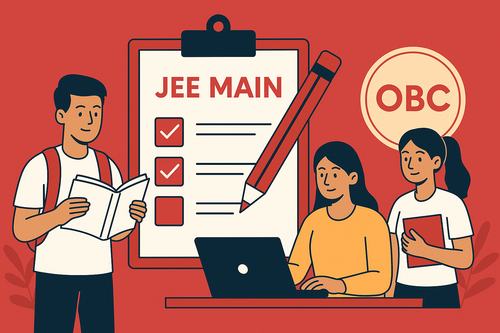
Wondering how many times OBC candidates can appear for JEE Mains? This detailed guide explains JEE Main Attempts for...

Dropping a year for JEE Mains? This in-depth strategy guide helps droppers optimise their JEE Main attempts with...

Confused about how many times you can appear for JEE Main? This guide explains the number of JEE attempts, session...
Resources
-
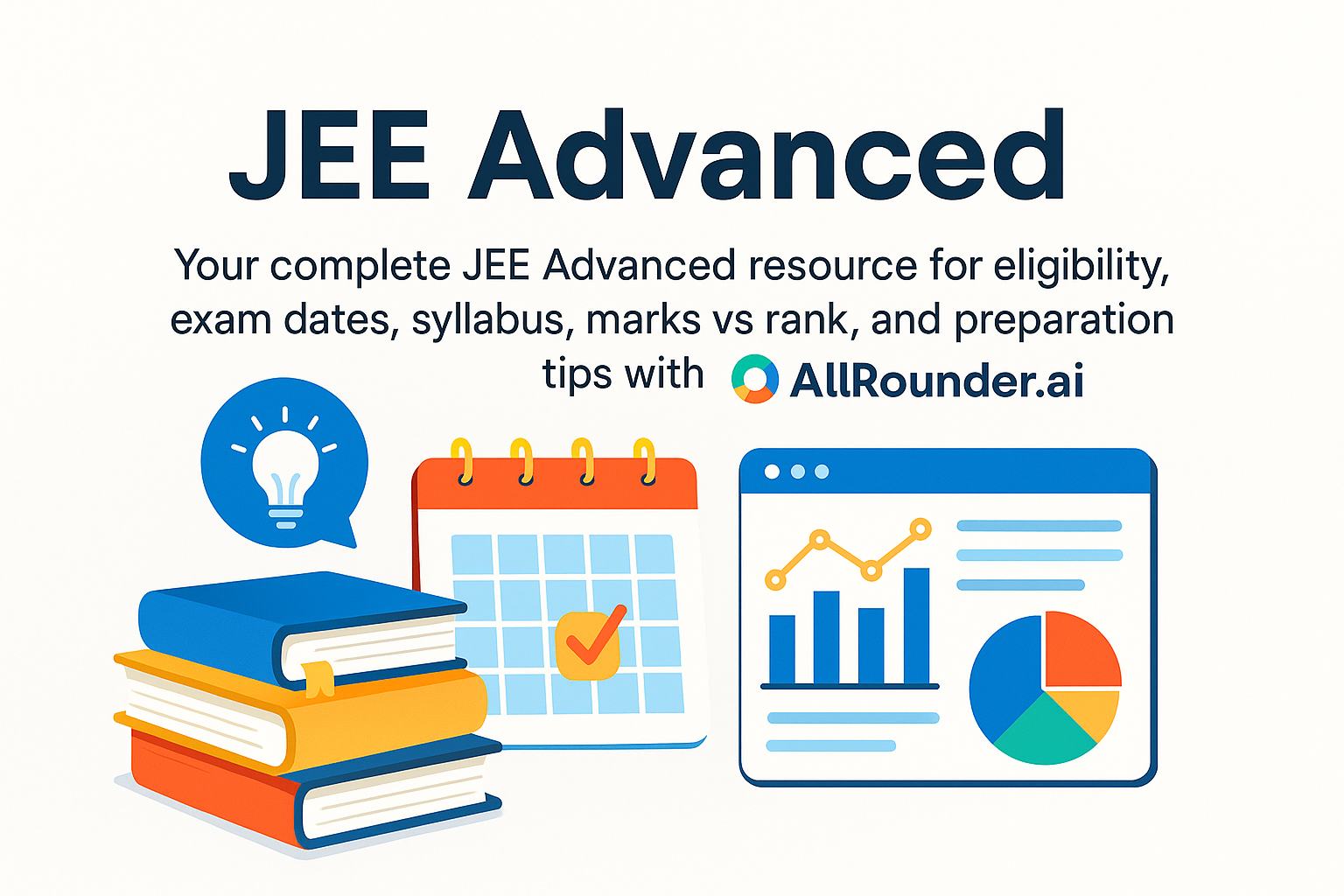
Your complete JEE Advanced resource for eligibility, exam dates, syllabus, marks vs rank, and...
-
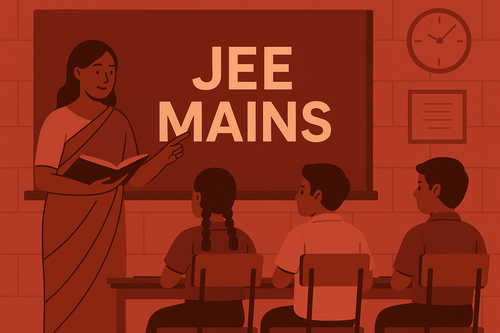
Understand the entire JEE Main process, from application and eligibility rules to the exam...
-

Explore the IB Board – a global curriculum emphasizing holistic, student-centered learning...
-

Learn about CBSE – India’s national school board offering a standardized curriculum, NCERT...
-

Explore everything about the ICSE board – its curriculum, subjects, exam format, and academic...
